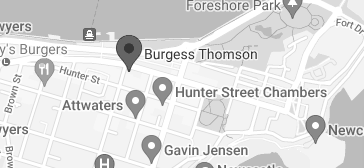Property Development & Subdivisions
Property Law & Conveyancing
expert legal advice for property developers
Property development is a lucrative industry with great potential for significant return on investment. The types of property that are developed commonly include including small or medium sized residential land, commercial buildings, mixed-use and vacant land developments. The process of developing a property involves several steps prospective investors need to be aware of. Not only do you need to find and purchase suitable land or property, you must also ensure the development in compliant with all rules and regulations, obtain necessary certification and then later, sell the development.
As with all financial ventures, property development presents its own challenges. There are many requirements you need to be aware of when considering developing property. Burgess Thomson can guide you through the necessary legal procedures and identify any issues you may not have considered.
How Burgess Thomson can help
Whether you are buying an existing property for renovation or buying land to build on, it is advised to seek the support of a legal team. When developing housing estates or medium to large scale businesses, planning consent for construction is required. Burgess Thomson can provide legal advice to ensure that you are aware of any issues affecting the property, and your legal obligations as a property developer.
The team at Burgess Thomson assists clients throughout the entire development approval process, allowing clients to free up more time for their plans. In the event of a dispute in the property development process, having the support of a legal team is essential to ensure you achieve the best result possible. The team at Burgess Thomson are experienced in the areas of negotiation and other alternative dispute resolution methods and will assist to settle the dispute without having to go to court.
GET A QUICK QUOTE
Enter your details for an obligation free quote.
Find out more about how we can help With Property Developments and Subdivisions.
FAQ's
What is a property developer/joint venture agreement?
A property development agreement or joint venture agreement is an important document when carrying out a property development with one or more parties. The purpose of this document is to outline the obligations of the parties involved and detail the necessary procedures in the event of a dispute or issue. This agreement should be drawn up at the beginning of the development to ensure the obligations of the parties are clear.
When is a Joint Venture Agreement or Development Agreement used?
The most common situations for a joint venture agreement or development agreement are:
- Landowner and Developer – one person contributes to the land while the other person carries out the development.
- Two Developers – the two parties acquire the property and carry out the development together, usually sharing costs and splitting the development obligations.
- Investor and Developer – the investor pays to purchase the land and funds the development costs, and the developer carries out the development.
Can you modify a development application?
You can apply to the Council for approval to modify a development consent under Section 4.55 of the Environmental Planning and Assessment Act 1979. This section allows a development consent to be modified, as long as the development remains substantially the same. If Council does not agree that the proposed modifications would result in substantially the same development as was originally approved, a new development application will need to be submitted for assessment. The types of modifications can include:
- Modifications involving minor errors, misdescription, or miscalculation – such as wrong plan numbers.
- Modifications involving minimal environmental impact – these might be internal design changes, amended landscape plans or drainage design amendments.
- Other modifications can include changes to windows, floor levels, heights, car parking generation and roof designs.



